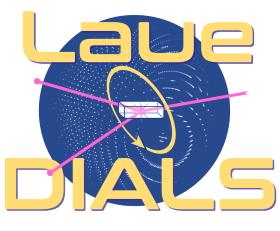#!/usr/bin/env python
"""
This script generates integrated MTZ files from refined data with predictions
"""
import logging
import sys
import time
from functools import partial
from itertools import repeat
from multiprocessing import Pool
import gemmi
import libtbx.phil
import numpy as np
import reciprocalspaceship as rs
from cctbx import sgtbx
from dials.array_family import flex
from dials.util import show_mail_handle_errors
from dials.util.options import (ArgumentParser,
reflections_and_experiments_from_files)
from laue_dials.algorithms.integration import SegmentedImage
from laue_dials.utils.version import laue_version
logger = logging.getLogger("laue-dials.command_line.integrate")
help_message = """
This script generates integrated MTZ files from refined data with predictions.
The program takes a refined geometry experiment file along with a predicted
reflection table, and uses those to integrate intensities in the data set.
The output is an MTZ file containing integrated intensities suitable for
merging and scaling.
The algorithm applied here is a variable elliptical summation algorithm
inspired by the VariableElliptical mode in Precognition. Elliptical
profiles are modeled for each strong reflection, with weak reflections
using an average of the k nearest strong spots, and then the pixel
intensities within are summed to generate integrated intensities
per reflection.
Examples:
laue.integrate [options] poly_refined.expt predicted.refl
"""
# Set the phil scope
phil_scope = libtbx.phil.parse(
"""
output {
filename = 'integrated.mtz'
.type = str
.help = "The output MTZ filename."
log = 'laue.integrate.log'
.type = str
.help = "The log filename."
}
nproc = 1
.type = int
.help = "Number of parallel integrations to do"
isigi_cutoff = 2.0
.type = float
.help = "I/SIGI threshold to use for marking strong spots."
""",
process_includes=True,
)
working_phil = phil_scope.fetch(sources=[phil_scope])
[docs]
def get_refls_image(refls, img_id):
"""
Get the set of reflections lying on a particular image.
Args:
refls (dials.array_family.flex.reflection_table): Reflection table.
img_id (int): Image ID.
Returns:
refls (dials.array_family.flex.reflection_table): Reflection table for the specified image.
"""
return refls.select(refls["id"] == img_id)
[docs]
def integrate_image(img_set, refls, isigi_cutoff):
"""
Integrate predicted spots on an image.
Args:
img_set (dxtbx_imageset_ext.Imageset): Image set.
refls (dials.array_family.flex.reflection_table): Reflection table.
isigi_cutoff (float): I/SIGI threshold.
Returns:
flex.reflection_table: Updated reflection table.
"""
img_num = refls["id"][0]
logger.info(f"Integrating image {img_num}.")
proctime = time.time()
# Make SegmentedImage
all_spots = refls["xyzcal.px"].as_numpy_array()[:, :2].astype("float32")
pixels = img_set.get_raw_data(0)[0].as_numpy_array().astype("float32")
sim = SegmentedImage(pixels, all_spots)
# Get integrated reflections only
refls = refls.select(flex.bool(sim.used_reflections))
# Integrate reflections
sim.integrate(isigi_cutoff)
# Update reflection data
i = np.zeros(len(refls))
sigi = np.zeros(len(refls))
bg = np.zeros(len(refls))
sigbg = np.zeros(len(refls))
profiles = sim.profiles.to_list()
for j in range(len(refls)):
prof = profiles[j]
if prof.success:
i[j] = prof.I
sigi[j] = prof.SigI
bg[j] = np.maximum((prof.background * prof.bg_mask), 0.0).sum()
sigbg[j] = np.sqrt(np.maximum((prof.background * prof.bg_mask), 0.0)).sum()
refls["intensity.sum.value"] = flex.double(i)
refls["intensity.sum.variance"] = flex.double(sigi**2)
refls["background.sum.value"] = flex.double(bg)
refls["background.sum.variance"] = flex.double(sigbg**2)
refls = refls.select(refls["intensity.sum.value"] != 0)
logger.info(f"Image {img_num} took {time.time() - proctime} seconds.")
return refls # Updated reflection table
[docs]
@show_mail_handle_errors()
def run(args=None, *, phil=working_phil):
"""
Run the integration script with the specified command-line arguments.
Args:
args (list): Command-line arguments.
phil: The phil scope for the program.
Returns:
None
"""
# Parse arguments
usage = "laue.integrate [options] poly_refined.expt predicted.refl"
parser = ArgumentParser(
usage=usage,
phil=phil,
read_reflections=True,
read_experiments=True,
check_format=True,
epilog=help_message,
)
params, options = parser.parse_args(args=args, show_diff_phil=False)
# Configure logging
console = logging.StreamHandler(sys.stdout)
fh = logging.FileHandler(params.output.log, mode="w", encoding="utf-8")
loglevel = logging.INFO
logger.addHandler(fh)
logger.addHandler(console)
logging.captureWarnings(True)
warning_logger = logging.getLogger("py.warnings")
warning_logger.addHandler(fh)
warning_logger.addHandler(console)
dials_logger = logging.getLogger("dials")
dials_logger.addHandler(fh)
dials_logger.addHandler(console)
dxtbx_logger = logging.getLogger("dxtbx")
dxtbx_logger.addHandler(fh)
dxtbx_logger.addHandler(console)
xfel_logger = logging.getLogger("xfel")
xfel_logger.addHandler(fh)
xfel_logger.addHandler(console)
logger.setLevel(loglevel)
dials_logger.setLevel(loglevel)
dxtbx_logger.setLevel(loglevel)
xfel_logger.setLevel(loglevel)
fh.setLevel(loglevel)
# Print version information
logger.info(laue_version())
# Log diff phil
diff_phil = parser.diff_phil.as_str()
if diff_phil != "":
logger.info("The following parameters have been modified:\n")
logger.info(diff_phil)
# Print help if no input
if not params.input.experiments or not params.input.reflections:
parser.print_help()
return
# Load data
reflections, expts = reflections_and_experiments_from_files(
params.input.reflections, params.input.experiments
)
preds = reflections[0] # Get predictions
# Remove duplicate expt + refl data
params.input.experiments = None
params.input.reflections = None
# Sanity checks
if len(expts) == 0:
parser.print_help()
return
# Get reflections and image data
imagesets = expts.imagesets()
ids = list(np.unique(preds["id"]).astype(np.int32))
get_refls = partial(get_refls_image, preds)
tables = list(map(get_refls, ids))
inputs = list(zip(imagesets, tables, repeat(params.isigi_cutoff)))
# Get initial time for process
start_time = time.time()
# Multiprocess integration
num_processes = params.nproc
logger.info("Starting integration.")
if num_processes == 1:
refls_arr = [integrate_image(*i) for i in inputs]
else:
with Pool(processes=num_processes) as pool:
refls_arr = pool.starmap(integrate_image, inputs, chunksize=1)
logger.info("Integration finished.")
# Construct an integrated reflection table
logger.info("Constructing reflection table")
final_refls = flex.reflection_table()
for refls in refls_arr:
final_refls.extend(refls)
refls = final_refls
# Get data needed for MTZ file
logger.info("Converting to MTZ format.")
hkl = refls["miller_index"].as_vec3_double()
cell = np.zeros(6)
for crystal in expts.crystals():
cell += np.array(crystal.get_unit_cell().parameters()) / len(expts.crystals())
cell = gemmi.UnitCell(*cell)
sginfo = expts.crystals()[0].get_space_group().info()
symbol = sgtbx.space_group_symbols(sginfo.symbol_and_number().split("(")[0])
spacegroup = gemmi.SpaceGroup(symbol.universal_hermann_mauguin())
# Generate rs.DataSet to write to MTZ
data = rs.DataSet(
{
"H": hkl.as_numpy_array()[:, 0].astype(np.int32),
"K": hkl.as_numpy_array()[:, 1].astype(np.int32),
"L": hkl.as_numpy_array()[:, 2].astype(np.int32),
"BATCH": refls["id"].as_numpy_array() + 1,
"I": refls["intensity.sum.value"].as_numpy_array(),
"SIGI": refls["intensity.sum.variance"].as_numpy_array() ** 0.5,
"xcal": refls["xyzcal.px"].as_numpy_array()[:, 0],
"ycal": refls["xyzcal.px"].as_numpy_array()[:, 1],
"wavelength": refls["wavelength"].as_numpy_array(),
"BG": refls["background.sum.value"].as_numpy_array(),
"SIGBG": refls["background.sum.variance"].as_numpy_array() ** 0.5,
},
cell=cell,
spacegroup=spacegroup,
).infer_mtz_dtypes()
# Save reflections
logger.info("Saving integrated reflections to %s", params.output.filename)
data.write_mtz(params.output.filename, skip_problem_mtztypes=True)
# Final logs
logger.info("")
logger.info(
"Time Taken for Total Processing = %f seconds", time.time() - start_time
)
if __name__ == "__main__":
run()
